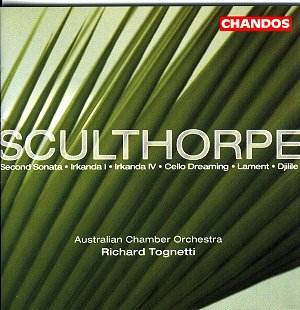The main attraction in this release is the inclusion
of the early Irkanda I (although this piece has been
recorded before) and Cello Dreaming of which this
is the first recording, if I am not mistaken. This piece, however,
must not be confused with its shorter cousin bearing the same title
but written for solo cello.
Irkanda I for solo violin was
completed in 1955 and is one of the early pieces that Sculthorpe
still acknowledges. He also composed Irkanda II
(for string quartet) and Irkanda III (for piano
trio), now withdrawn although there still exists a short piece
From Irkanda III for piano trio. Irkanda IV
for violin, strings and percussion is one of his finest scores
ever and unquestionably one of his best-loved works. Irkanda
I is a free fantasy already displaying several characteristics
which we have come to regard now as Sculthorpe’s trademarks, including
bird-like glissandi, long-drawn singing lines as well as
a real flair for string writing. Sculthorpe has withdrawn a number
of his early works, but he is never one to waste a good idea;
material from earlier discarded works has often been recycled
in later pieces. Irkanda IV is no exception. Sculthorpe
reworked some material from the song cycle Sun to
words by D.H. Lawrence, from Irkanda II and from
the Sonata for Viola and Percussion into what was
to become one of his most popular works. This beautifully moving
piece is a deeply felt elegy prompted by the recent death of his
father and by the death of Wilfrid and Peggy Mellers’ baby. Irkanda
IV is thus an intensely personal work in which Sculthorpe
put all his heart; and the tense urgency of the present recording
(the third by the A.C.O.) has a gripping poignancy, partly missing
in the earlier recordings. It is perfectly suited to the elegiac
character of this deeply moving threnody.
Lament was originally written
for strings in 1976. Fifteen years later, Sculthorpe slightly
reworked it by extending the prominent cello part. The version
for cello and strings is, of course, the one heard here, beautifully
played by Emma-Jane Murphy.
Sculthorpe’s three Sonatas for Strings are arrangements
of three string quartets from various periods of his composing
life. The Second Sonata for Strings is based on
the Ninth String Quartet of 1975.
Cello Dreaming for cello, strings
and percussion was written on a commission from the BBC and was
first performed by Steven Isserlis and the BBC Philharmonic conducted
by Yan Pascal Tortelier. Melody is clearly at the heart of this
richly lyrical work that again generously draws from Sculthorpe’s
sources. The big tune has a clear Balinese ring (not a rarity
in Sculthorpe’s output) and sings along in ecstatic elation, subtly
punctuated by metal percussion and enshrined in bird-like glissandi
(another Sculthorpe fingerprint). The composer obviously poured
all his heart into this lushly Romantic work that makes a most
welcome entry into his abundant discography. Another immaculate
reading by Emma-Jane Murphy who plays throughout with remarkable
aplomb.
The Aborigine tune Djilili ("Whistling-duck
on the billabong") has become Sculthorpe’s signature tune
for this tune, already heard in the early Fourth String Quartet
on 1950, has remained with him since then. He made several arrangements
of it for various instrumental combinations (cello and piano,
piano, percussion, string quartet, viol consort and chamber orchestra)
and the version for string orchestra heard here was made as recently
as 2001.
The Australian Chamber Orchestra has a long association
with Sculthorpe’s music which they have played and recorded on
many occasions. These performances recorded in the presence of
the composer could not be bettered. Though it inevitably duplicates
parts of the earlier recordings (either Southern Cross or ABC
Classics), this is a most desirable release. This is particularly
true in the case of the rarely heard Irkanda I and
the beautiful Cello Dreaming.
Hubert Culot
